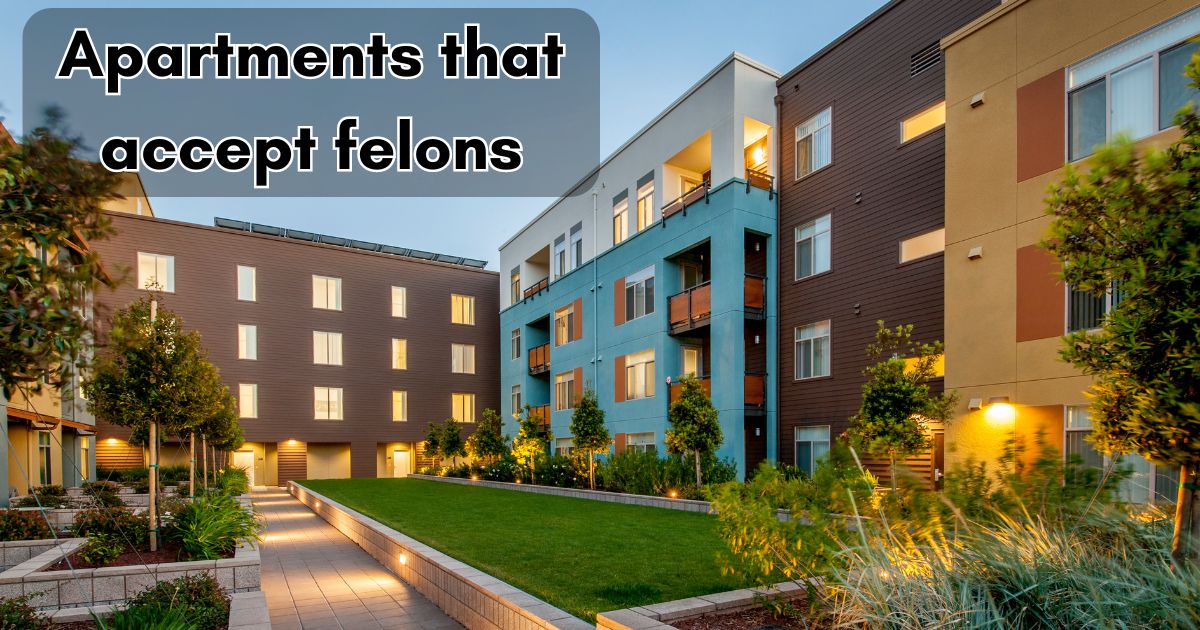Finding stable housing after a felony conviction can be an uphill battle. Landlords often conduct thorough background checks, and a criminal record can significantly reduce the chances of securing an apartment. The stigma attached to a felony conviction creates barriers that go beyond just finding a place to live—it can hinder employment opportunities and disrupt personal relationships. For many felons, finding a landlord willing to look past their criminal history is not just about securing a roof over their heads but about reclaiming their lives and starting anew.
The importance of stable housing cannot be overstated in the process of reintegration into society. A stable home environment provides the foundation for building a new life, offering a sense of security and stability that is crucial for success. Without a place to call home, the risk of recidivism increases significantly, trapping individuals in a cycle of crime and punishment. Understanding these challenges is the first step in navigating the complex landscape of finding apartments that accept felons.
Why Apartments That Accept Felons Are Important
The importance of finding apartments that accept felons goes beyond mere housing—it plays a critical role in the overall success of rehabilitation and reintegration. Studies have shown that individuals with stable housing are less likely to reoffend, highlighting the connection between secure housing and reduced recidivism rates. This makes finding apartments that accept felons a vital component of any comprehensive strategy aimed at reducing crime and promoting public safety.
Denying housing to individuals with criminal records not only impacts the individual but also has broader social implications. It perpetuates cycles of poverty and homelessness, strains social services, and increases the burden on the criminal justice system. Moreover, it reinforces social stigmas and barriers, making it even more difficult for individuals to reintegrate and become productive members of society. By understanding the importance of apartments that accept felons, we can begin to address the systemic issues that contribute to these challenges and work towards more inclusive and supportive communities.
Understanding Legal Rights
Know Your Rights as a Felon Tenant
Navigating the rental market as a felon requires a solid understanding of your legal rights. While landlords are legally allowed to consider a tenant’s criminal history, they must do so in a way that complies with fair housing laws. The Fair Housing Act, for example, prohibits discrimination based on race, color, religion, sex, national origin, familial status, or disability. Although the act does not specifically cover criminal history, policies that disproportionately affect individuals of a particular race or ethnicity may be considered discriminatory.
It’s essential to know that while landlords can deny housing based on a felony conviction, they must have a legitimate business reason for doing so. This means that they cannot have a blanket policy that denies all felons; instead, they should consider the nature and severity of the offense, the time elapsed since the conviction, and whether the crime is relevant to the safety and property of other tenants. Being aware of these rights can help you challenge discriminatory practices and improve your chances of finding an apartment that accepts felons.
State Laws on Renting to Felons
State laws regarding the rental of apartments to felons vary widely, with some states offering more protections than others. For example, in states like California, landlords are prohibited from denying housing solely based on a criminal conviction if the applicant has successfully completed parole or probation. Other states, however, allow landlords more discretion in making rental decisions based on criminal history.
It’s crucial to research the specific laws in your state to understand your rights and any potential limitations. In states with more lenient policies, felons may find it easier to secure housing, while in states with stricter laws, it may be necessary to explore alternative housing options. Understanding the legal landscape in your area will enable you to navigate the rental market more effectively and advocate for yourself during the application process.
Background Checks and Rental Applications
Background checks are a standard part of the rental application process, and for felons, this step can be particularly daunting. Landlords typically use background checks to assess an applicant’s criminal history, creditworthiness, and rental history. While a felony conviction can raise red flags, it’s not necessarily a deal-breaker—especially if you approach the application process with a well-prepared strategy.
One way to navigate this challenge is by being upfront about your criminal history. Many landlords appreciate honesty and transparency, and addressing your past convictions directly can help build trust. Additionally, consider providing a personal statement or letters of recommendation that highlight your rehabilitation efforts, stable employment, and commitment to being a responsible tenant. By proactively addressing potential concerns, you can increase your chances of finding an apartment that accepts felons.
Preparing for the Search
Gathering Necessary Documents
Before beginning your search for apartments that accept felons, it’s essential to gather all the necessary documents. Having these documents ready will streamline the application process and demonstrate to landlords that you are organized and prepared. Key documents include a valid ID, proof of income, rental history, references, and, if applicable, a letter of explanation regarding your criminal history.
Your rental history and references are particularly important, as they can provide landlords with a sense of your reliability as a tenant. If you have lived in transitional housing or with family members since your conviction, include these details in your rental history. Additionally, letters of recommendation from employers, probation officers, or community leaders can strengthen your application by highlighting your positive attributes and commitment to turning your life around.
Creating a Personal Statement
A personal statement can be a powerful tool in your search for apartments that accept felons. This statement allows you to address your criminal history directly, provide context for your conviction, and explain the steps you have taken toward rehabilitation. It’s an opportunity to humanize your application and help landlords see beyond your criminal record.
When crafting your personal statement, be honest and straightforward about your past, but focus on the positive changes you have made. Discuss any counseling, education, or job training programs you have completed, as well as your current employment status and long-term goals. Emphasize your commitment to being a responsible tenant and a positive member of the community. A well-written personal statement can make a significant difference in how landlords perceive your application.
Building a Positive Rental History
Building a positive rental history is crucial for felons seeking housing. If you have gaps in your rental history due to incarceration, consider staying in transitional housing or with family members who can vouch for your behavior as a tenant. Even short-term stays can be valuable in establishing a track record of responsible tenancy.
In addition to securing stable housing, focus on maintaining a good relationship with your current landlord. Pay your rent on time, follow the terms of your lease, and communicate openly with your landlord about any issues that arise. These actions will help you build a positive rental history that you can use to strengthen future rental applications. Over time, a solid rental history can help mitigate the impact of your criminal record and increase your chances of finding apartments that accept felons.
Also Read: Cape Coral Drowning
Where to Find Apartments That Accept Felons
Online Resources and Listings
The internet is a valuable resource for finding apartments that accept felons. Numerous websites and platforms specialize in felon-friendly housing, allowing you to search for available units based on your location and budget. Websites like Craigslist, Zillow, and Rent.com often feature listings from private landlords who may be more willing to consider applicants with a criminal history.
When using online resources, it’s important to be strategic in your search. Use keywords like “felon-friendly,” “second-chance housing,” or “criminal record accepted” to filter your results. Additionally, consider joining online forums or social media groups dedicated to felon housing—these communities can provide valuable tips, advice, and leads on available apartments. By leveraging the power of the internet, you can significantly expand your search and increase your chances of finding an apartment that accepts felons.
Working with Local Nonprofits
Local nonprofits can be a tremendous resource for felons seeking housing. Many organizations are dedicated to helping individuals with criminal records find stable housing, offering services such as housing placement, financial assistance, and legal advocacy. Nonprofits like The Salvation Army, Goodwill, and local reentry programs often have relationships with landlords who are willing to rent to felons.
These organizations can also advocate on your behalf, helping to bridge the gap between you and potential landlords. They may offer case management services, helping you gather necessary documents, prepare your rental application, and even negotiate lease terms. By connecting with local nonprofits, you can access a support network that increases your chances of securing housing and successfully reintegrating into the community.
Using Housing Locators
Housing locators are professionals who specialize in helping individuals find suitable housing based on their specific needs and circumstances. For felons, working with a housing locator can be particularly beneficial, as these professionals often have extensive knowledge of the local rental market and can identify landlords who are more open to renting to individuals with criminal records.
When choosing a housing locator, look for someone who has experience working with felons or who specializes in second-chance housing. These professionals can save you time and effort by narrowing down your search to apartments that accept felons and helping you navigate the application process. Additionally, they may have access to exclusive listings or be able to negotiate on your behalf, increasing your chances of finding a suitable apartment.
Reaching Out to Landlords Directly
Sometimes, the most effective way to find apartments that accept felons is to reach out to landlords directly. This approach allows you to explain your situation, provide context for your criminal history, and discuss your qualifications as a tenant before they run a background check. Many landlords appreciate the honesty and are willing to give applicants a second chance if they feel confident in their ability to be a responsible tenant.
When reaching out to landlords, be prepared to provide references, proof of income, and a personal statement that addresses your criminal history. Keep your communication polite and professional, and be upfront about your past without dwelling on it. Emphasize your current stability, employment, and commitment to being a good tenant. By taking the initiative to reach out directly, you can build a personal connection with landlords and increase your chances of finding an apartment that accepts felons.
Types of Apartments That Accept Felons
Affordable Housing Options
Affordable housing options are a viable solution for felons seeking apartments. These options often include income-based housing, where rent is calculated based on a percentage of your income, making it more manageable for individuals with limited financial resources. Many affordable housing complexes are funded by government programs that aim to provide housing for low-income individuals, including those with criminal records.
To qualify for affordable housing, you will typically need to meet specific income requirements and provide documentation of your financial situation. While the application process can be competitive, securing a spot in an affordable housing complex can provide you with a stable and affordable place to live. Additionally, many of these complexes offer supportive services that can help you with employment, education, and other aspects of your life as you work towards rebuilding your future.
Private Landlords vs. Corporate-Owned Apartments
When searching for apartments that accept felons, it’s essential to understand the differences between renting from private landlords and corporate-owned apartment complexes. Private landlords are individuals who own and manage their rental properties, and they often have more flexibility in their rental decisions. This flexibility can work in your favor, as private landlords may be more willing to consider applicants with criminal records, especially if you can demonstrate financial stability and a positive rental history.
On the other hand, corporate-owned apartment complexes are typically managed by large property management companies with strict rental policies. These companies often have standardized application processes and may be less likely to make exceptions for applicants with felony convictions. However, some corporate-owned complexes may offer second-chance housing programs specifically designed to help individuals with criminal records. It’s worth exploring both options to determine which is more suitable for your situation.
Roommates and Shared Housing
Shared housing and living with roommates can be a practical alternative for felons who are struggling to find individual apartments. By sharing a rental property, you can reduce your financial burden and increase your chances of finding housing, as landlords may be more willing to rent to a group of tenants rather than a single applicant with a criminal record.
When considering shared housing, it’s important to be upfront with potential roommates about your criminal history. Open and honest communication is key to building trust and ensuring that everyone is comfortable with the living arrangement. Additionally, explore online platforms and social media groups dedicated to finding felon-friendly roommates and shared housing opportunities. This approach can open up new possibilities for securing stable housing while also providing a support network as you navigate life post-conviction.
Strategies for Success
Improving Your Rental Application
To increase your chances of securing an apartment that accepts felons, focus on improving your rental application. A strong application can help mitigate the impact of your criminal record and showcase your qualifications as a tenant. Start by gathering all necessary documents, including proof of income, references, and a personal statement that addresses your criminal history.
In addition to providing the required documents, consider including letters of recommendation from previous landlords, employers, or community leaders who can vouch for your character and reliability. These references can provide landlords with a positive perspective on your ability to be a responsible tenant. Additionally, if you have completed any rehabilitation programs, job training, or educational courses, include this information in your application to demonstrate your commitment to personal growth and stability.
Negotiating Lease Terms
Negotiating lease terms can be an effective strategy for securing an apartment that accepts felons. If a landlord is hesitant to rent to you due to your criminal history, offering to negotiate specific lease terms can help alleviate their concerns. For example, you could offer to pay a higher security deposit, agree to a shorter lease term, or provide additional references.
When negotiating lease terms, it’s important to approach the conversation with confidence and professionalism. Be prepared to discuss your criminal history openly and explain the steps you have taken to rehabilitate yourself. By demonstrating your commitment to being a responsible tenant, you can increase your chances of finding a landlord who is willing to work with you.
Maintaining Good Tenant Behavior
Once you secure an apartment, maintaining good tenant behavior is crucial for building a positive rental history and ensuring your long-term housing stability. Paying your rent on time, following the terms of your lease, and communicating openly with your landlord are essential practices that demonstrate your reliability as a tenant.
In addition to fulfilling your responsibilities as a tenant, it’s important to be a good neighbor. This includes being respectful of other tenants, keeping your living space clean and well-maintained, and addressing any issues or concerns promptly. By maintaining good tenant behavior, you can build a positive reputation that will benefit you in future rental applications and contribute to a stable and successful living situation.
Additional Support
Legal Assistance for Housing Issues
If you encounter legal challenges during your search for apartments that accept felons, seeking legal assistance may be necessary. Legal aid organizations and pro bono lawyers can provide support and guidance on housing discrimination issues, lease disputes, and other legal matters related to your rental application.
When facing potential discrimination or unfair treatment from landlords, having legal representation can help you protect your rights and advocate for yourself effectively. Many legal aid organizations offer free or low-cost services for individuals with limited financial resources, making it accessible for felons seeking housing. Don’t hesitate to reach out for legal assistance if you believe your rights are being violated or if you need help navigating complex housing laws.
Support Networks and Resources for Felons
In addition to legal assistance, connecting with support networks and resources for felons can provide valuable guidance and encouragement during your search for housing. Reentry programs, community organizations, and support groups offer a range of services designed to help individuals with criminal records reintegrate into society, including housing assistance, job training, and counseling.
These support networks can also provide a sense of community and belonging, helping you build relationships with others who have faced similar challenges. By tapping into these resources, you can access the tools and support you need to overcome obstacles and achieve long-term success in your housing search and beyond.
Conclusion
Finding apartments that accept felons can be a challenging and often frustrating process, but it’s important to remain persistent and proactive in your search. By understanding your rights, preparing a strong rental application, and utilizing the resources available to you, you can increase your chances of securing stable housing.
Remember that finding a place to live is a crucial step in rebuilding your life and moving forward after a felony conviction. While the road may be difficult, it’s essential to stay focused on your goals and to seek out the support and guidance you need along the way. With determination, patience, and the right strategies, you can overcome the barriers to housing and create a stable, secure future for yourself.









